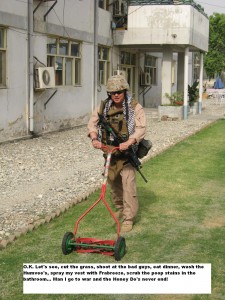The Mental Health of Military Children by Emily Isenberger
May 17th, 2012 Posted in The SandGram v1.0The Mental Health of Military ChildrenChildren of active duty service members often face unique problems when a parent deploys, particularly when it comes to mental and emotional well-being. While mental health issues certainly do not affect all military children, recent research has demonstrated enough of a trend to raise alarm and many looking for online counseling programs are beginning to see the need to specialize in helping military children. In most cases, the key to combatting deployment-related stress is through community and camaraderie, so group counseling will be especially important. Children who feel as if the adults around them understand their fears and sadness, or who could be around other children in the same position, are likely to fare far better then those who feel utterly alone.
Since the U.S. engagement in the wars in Iraq and Afghanistan, deployments have surged, which means that record numbers of military families have seen at least one parent absent for extended periods. Deployments typically last for at least 13 months. Children of all ages tend to view this absence with a mix of emotions that intensify over time.
A study published in The Archives of Pediatric and Adolescent Medicine took a hard look at the emotional health of military children and families between 2003 and 2006. Researchers found that children were indeed suffering. Nearly 17% of the children studied had been officially diagnosed at some point during the deployment with a mental disorder such as depression or anxiety. The length of time was paramount, the study reported that, “Children of parents who spent more time deployed between 2003 and 2006 fared worse than children whose parents were deployed for a shorter duration.”
A separate study conducted by the National Military Family Association, a non-profit group, found similar results, but placed an emphasis on the remaining parent’s own mental health. Caregivers who were themselves struggling to cope with the deployment were often not able to identify or address similar struggles in their children, the report, published in 2009, concluded.
“We have found there is a direct correlation between the mental health of the caregiver and the well-being of the child,” the study said. Teenagers tended to be the most prone to mental illness or anxiety, particularly in situations where there were also younger children at home. The NMFA stated, “They are often encumbered by the feeling of trying to keep the family going, along with anger over changes in their schedules, increased responsibility, and fear for their deployed parent.”
Young teenagers and adolescents are also the demographic most likely to fall victim to bullying, both at school and online. Children who are already feeling anxious about a missing parent tend to be more fragile emotionally, and may be more subject to teasing and harassment. On the flip side, they may be more likely to perpetrate those behaviors themselves. This is particularly true of military children who do not live on traditional bases. On a military post, nearly all children, parents, and teachers can relate to what a deployment feels like, and can watch for the signs of a child who is suffering. This is not usually the case in civilian communities.
Members of the National Guard and Army Reserve are usually the most at risk in terms of community understanding, as they live most of their lives as ordinary civilians. “Our study found that Guard and Reserve caregivers reported fewer supports for their families and worse mental health than those in the active component,” the NMFA said. “They find themselves ‘suddenly military’ without resources to support them.”
Most of the time, the very family that is split apart by the deployment must be the strongest part of children’s worlds. This means that the remaining parent must be present, vigilant, and willing to talk about the tough issues. Seeking out community resources for additional help is usually also important.
Mental health problems for military children are not inevitable. Families can plan ahead for the pitfalls of deployment. Most military installations offer counseling services for families of deployed service members. National organizations like Operation Military Kids, an Army initiative designed to support children of deployed personnel, also offer a bevy of resources. Taking advantage of help when it is offered is one of the best ways for military families to stay on top of their health, and stay strong for the eventual return of the deployed parent.
Tags: Emily Isenberger, The Mental Health of Military Children





